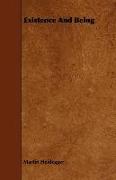- Start
- Existence and Being
Existence and Being
Angebote / Angebote:
FOREWORD In appearance, Professor Heidegger is short and slight his hair is thick and jet black with occasional white streaks. When he emerged from the small skiing hut, high up in the mountains, to greet me, he was dressed in the costume of a Swabian peasant, a dress he often also used to wear when he was Rector of Freiburg University. His heavy, squarish sluing boots it was summer emphasised still more strongly his relationship to the soil. He was born in 1889, in Messkirch and his brother still farms in the region. Martin Heidegger, too, has never left it. When Hitler called him to Berlin in 1935, he rejected the offer. The world had to come to him, to Freiburg. There he lives, with Hellingraths edition of Halderlins works. This closeness to Holderlin is no accident but an essential key to an understanding of Heideggers own philosophy. For Holderlin came from the same physical region, he faced the same spiritual problems, and he experienced more lucidly and bitterly the ultimate meaning of not than any other person who could give expression to it in song. The parallel with Heidegger is close, indeed, if thought is substituted for song. On both occasions when I met Professor Heidegger, in June, 1946, and in October, 1947, I had to drive for an hour to the small town of Todtnau in the Black Forest Mountains, then to climb still further until the road became a path and all human habitation scattered and invisible There on top of a mountain, with the valley deep down below, with nothing but space and wilderness all around, in that small skiing hut, I spoke to the phxlosopher. He had not been to Freiburg for six months when I saw him for the second time. His living conditions were primitive his books were few, and his only relationship to the world was a stack of writing paper. His whole life revolved within those white sheets and it seemed to me that he wanted nothlng else but to be left in peace to cover those white sheets with his writmg. The atmosphere of silence all around provided a faithful setting for Heideggers philosophy. I could not help comparing it with the atmosphere I had encountered in the house of Professor Berdyaev near Paris and that of Professor Jaspers in Heidelberg. In every case, the external world faithfully reflected the world of the mind. In Berdyaevs case it was the spirit of communion in Jasperss that of spiritual engagement. But in Heideggers case it was the spirit of overwhelming solitude. With the four essays in this book, which Professor Heidegger gave me, this much-discussed philosopher now appears for the first time before the English-speaking world. As Professor Heidegger pointed out to me, the four essays are complementary and have an organic unity...
Folgt in ca. 15 Arbeitstagen
